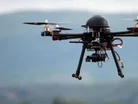Could drones be set to leapfrog Africa’s infrastructure problems?

Follow @AfricaBizReview on Twitter.
The Ecole Polytechnique Federale de Lausanne (EPFL) has set up a unique technology project in order to provide an innovative solution to Africa’s infrastructure problems.
The Afrotech project plans to use fleets of drones to carry small packages across distances of up to 50 miles (80km) with the goal of potentially fulfilling up to 15 percent of Africa’s transport requirements in the next decade.
Leaders from the project have already indicated that using drones in this way could provide blood stocks to remote health clinics, potentially saving countless lives.
Given the often poor and unpredictable weather conditions across the continent, using drones could take couriers out of danger zones.
Once drone fleets have proved their worth delivering humanitarian aid and vital healthcare technology it is hoped that businesses will recognise their potential for serious investment. The project director Jonathan Ledgard stated: “There will be big money, billions of dollars, within a decade, I'm sure of it.”
It is widely recognised that Africa’s infrastructure is woefully underfunded and will require billions in order to bring it up to standard; drone technology could leapfrog this problem and also provide governments on the continent with the opportunity to invest in infrastructure developments further down the line.
Although no longer in its infancy, drone technology faces both physical and legislative barriers before it can provide the coverage that the Afrotech project is proposing. Firstly, the company needs to negotiate with governments in order to provide the regulatory framework through which future innovation will operate. Furthermore, the maximum carry weight of a commercial helicopter drone is just under 10 kilos, which severely limits its operational abilities.
In a decade it will certainly be interesting to see how far projects such as Afrotech progress, it will be worth noting if a larger corporate competitor assumes control in order to dominate the competition. The potential commercial and humanitarian benefits could potentially be substantial, provided large investment can deliver adequate, cost-effective technological advancement.
RELATED:
VIDEO: UAE contributes $30 billion to African Infrastructure development: http://www.africa.businesschief.com/finance/1715/VIDEO:-UAE-Contributes-30-billion-to-African-Infrastructure-Development
- Climate tech funding: why the opportunity in Africa is hugeSustainability
- Etihad Rail – connecting the UAE’s seven emirates and beyondLeadership & Strategy
- Record number of CFOs prioritising investment, say DeloitteCorporate Finance
- European startup funding triples in 2021 to record highTechnology



